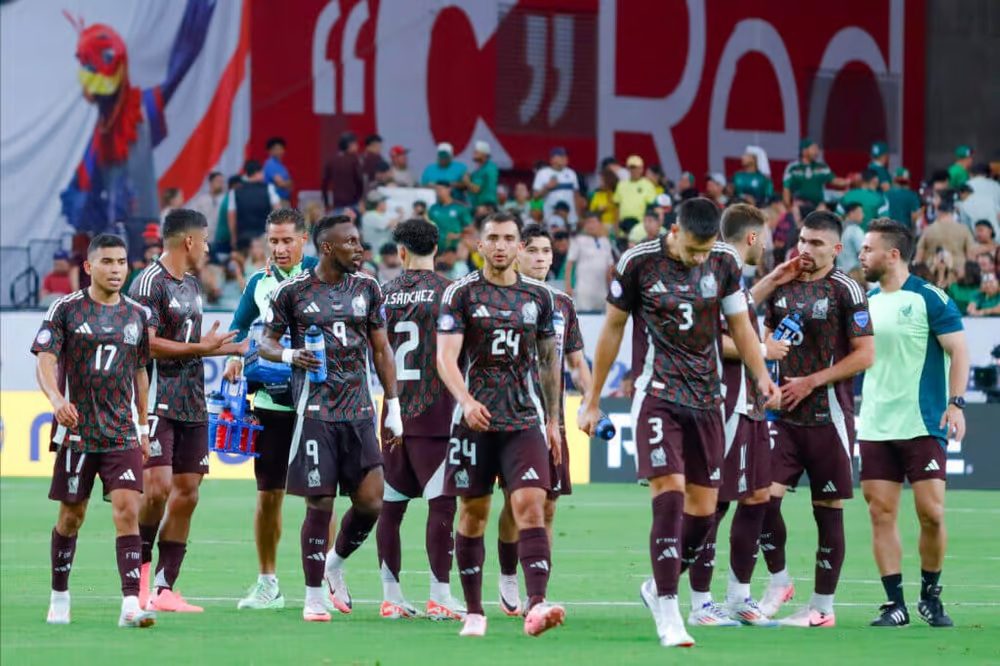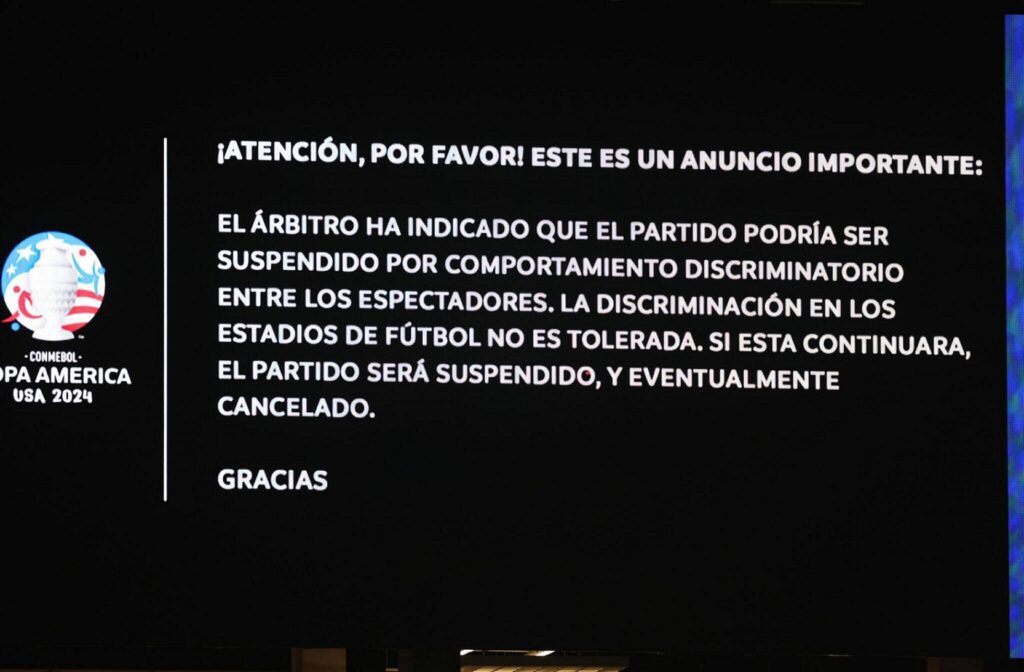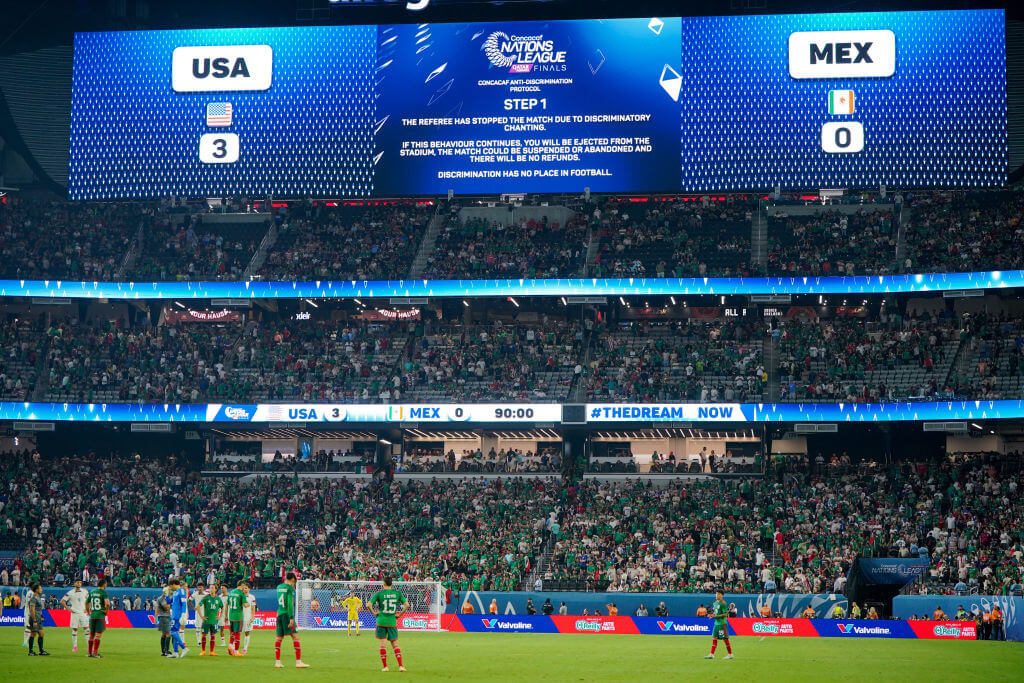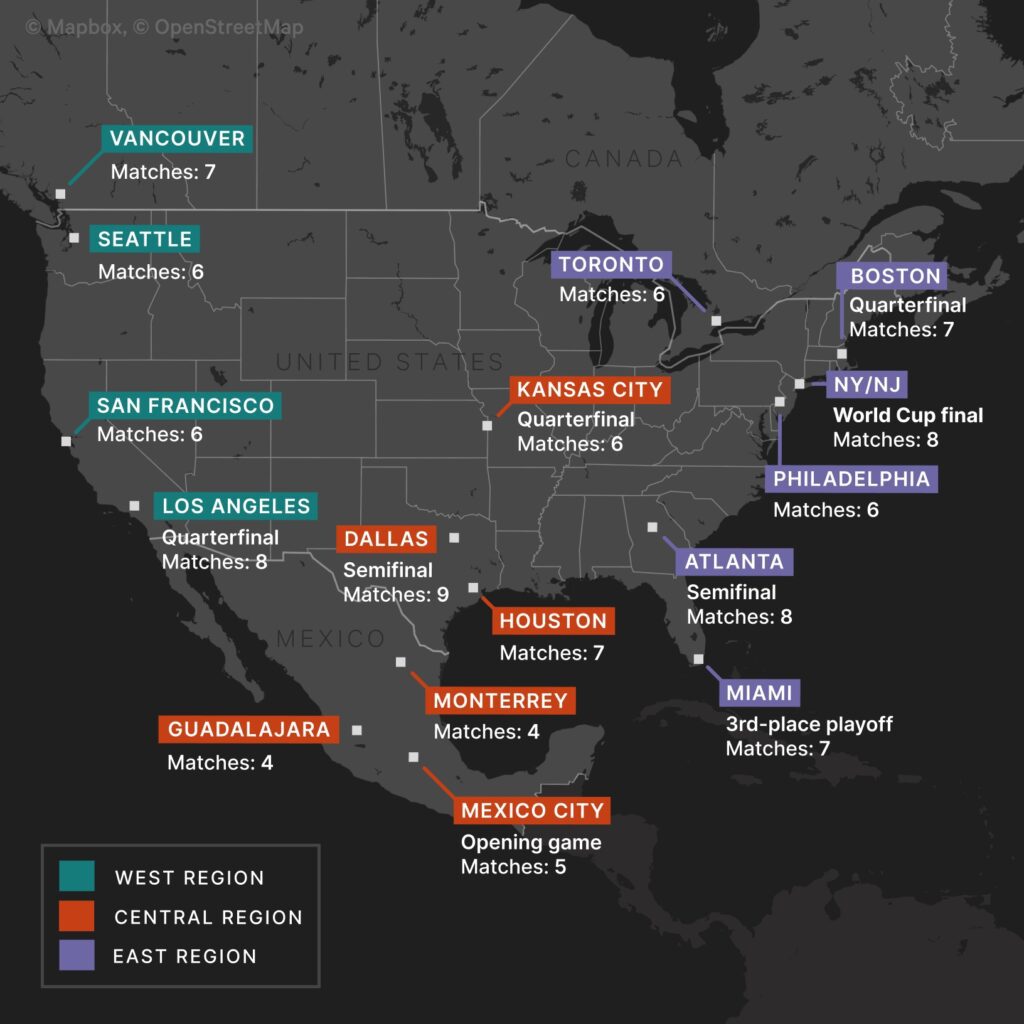Mexico vs Ecuador Copa America game threatened with stoppage over homophobic chanting
By Stuart James
Published on June 30, 2024

The Copa America game between Mexico and Ecuador saw supporters told to stop a homophobic chant with the threat of the match being suspended.
There were three separate announcements over the stadium’s public address system at State Farm Stadium, Arizona during the 0-0 draw which saw Mexico eliminated from the tournament.
There was also a message displayed on the screen calling for the chant to be stopped.
Warnings have been played to fans ahead of matches at the tournament and there is a three-step protocol in place for games to be stopped to try and combat discrimination from the stands.
The homophobic chant, in which fans shout a slur at the opposing goalkeeper during his run-up to take a goal kick, has been heard at Mexican football matches for many years, with differing stories as to its origins.
Authorities — particularly world governing body FIFA, the Mexican Football Federation (FMF), and CONCACAF, the governing body of North America, Central America and Caribbean soccer — have increased efforts to stop it, but sections of the Mexico fanbase continue to ignore those initiatives.
The Copa America is organised by CONMEBOL, the South American football federation.
Mexico will co-host the 2026 men’s World Cup together with the United States and Canada. Thirteen matches will be played in Mexico, including the opening game at Estadio Azteca in Mexico City on Thursday, June 11.
What are the rules at Copa America?
In 2019, football’s world governing body FIFA introduced a three-step protocol to try to combat discrimination from the stands, and this is the protocol in play at the Copa America.
In the case of “critical and continuing discriminatory incidents”, match officials can apply the following measures:
- Stop the match. The referee halts the game so an announcement can be made to supporters in the stadium. This action can be taken a number of times.
- Suspend the match. Ask players to return to their dressing rooms for a reasonable amount of time or until the chanting stops.
- Abandon the match. This is very much a last resort and would only be taken “in a critical scenario”, according to FIFA, after consultation with the team captains and security advisors.
During Mexico’s draw with Ecuador, the message below was shown on the LED screen in Spanish. It translates as: “The referee has indicated that the match could be suspended due to discriminatory behaviour among spectators. Discrimination in football stadiums is not tolerated. If this continues, the match will be suspended, and eventually canceled.”

What has been done to try to stop the chant?
The Mexican Football Federation (FMF), Soccer United Marketing (SUM), the federation’s U.S.-based marketing partner, and CONCACAF, the governing body of North America, Central America and Caribbean soccer, has also invested time and money to produce public awareness campaigns. This has included social media campaigns, statements on tickets and banners. The FMF then instituted even stricter controls that required fans to register for a fan ID card, using facial recognition to ban those caught in the act at national team matches.
CONCACAF’s “What’s Wrong is Wrong” anti-discrimination campaign launched in 2021, and was re-launched in 2023 to coincide with the United States men’s national team facing Mexico in a Nations League semi-final in June of that year.
At club level, LAFC in Major League Soccer had success in eradicating the chant from their matches thanks to organised fan groups preaching messages of inclusion alongside members of the club.
Has this happened before?
Yes, many times, although Mexico are of course not the only nation whose fans have engaged in discriminatory chanting.
In September 2021, Mexico defeated Jamaica 1-0 in a World Cup qualifier at the Estadio Azteca without fans owing to prior use of the homophobic slur.
FIFA’s disciplinary committee opened proceedings during the 2022 men’s World Cup in Qatar after the chant was heard during Mexico’s matches against Poland and Saudi Arabia. FIFA’s anti-discrimination monitoring system reported fans making repeated “discriminatory reference(s) to gay men”.
After Mexico was eliminated in the group stage, former FMF president Yon De Luisa said: “We’ve worked hand in hand with FIFA and with CONCACAF in order to prevent this. I believe that we managed to control (the chant) very well in the first two matches and practically during the entirety of the third. We recognise that this is a group effort and that the referees at competitions where Mexico typically participates are trained to resolve this type of situation.
“We believe that had (the referee) shown the (Saudi) goalkeeper a yellow card during the many times that he wasted, surely the chant would not have been heard. Our fans behaved exemplary during this World Cup.”
Mexico were fined 100,000 Swiss francs ($56,000/£44,000 at current rates) — a 50,000 fine with a further 50,000 to be spent on a campaign educating fans — and are appealing the decision at the Court of Arbitration for Sport in Lausanne, Switzerland.
In June 2023, Mexico’s CONCACAF Nations League semi-final against the United States men’s national team in Las Vegas was stopped in the 90th minute with the U.S. 3-0 up. When play resumed, 12 minutes of stoppage time were signalled but more chanting prompted the referee to end the match inside eight minutes.

There were also two delays at AT&T Stadium in Arlington, Texas, during the CONCACAF Nations League final in March 2024, this time with the U.S. 2-0 up against Mexico.
CONCACAF condemned the chanting and added: “It is extremely disappointing that this matter continues to be an issue at some matches, particularly in the context of the next two years presenting such a tremendous opportunity to grow the sport in our region.
“We will continue to urge fans to support their teams positively and with respect for the opposition and all participants in the game.”
Gianni Infantino, FIFA president, added on Instagram: “Discrimination, of any kind, has no place in football and no place in society, and I call on the relevant authorities to ensure that those responsible are held to account for their actions.”
What does this mean for the 2026 World Cup?
This is the big question. Mexico will kick off in the World Cup’s opening match at Estadio Azteca in Mexico City on Thursday, June 11, then play in Guadalajara on June 18 and then back in Mexico City on June 24. The country is hosting 13 matches during the tournament.

FIFA is organising the tournament and its three-step protocol will be in place.
The consequences of a match being delayed or abandoned could range from fines to forfeiting the game.
(Top photo: Alvaro Davila/Jam Media/Getty Images)
This piece was republished from The New York Times: The Athletic.